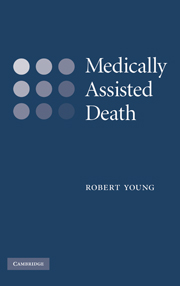Book contents
- Frontmatter
- Contents
- Acknowledgments
- 1 Introduction
- 2 A case for the legalisation of voluntary medically assisted death
- 3 Medical futility
- 4 Physician-assisted suicide
- 5 The sanctity of human life
- 6 Killing versus letting die, the doctrine of double effect, and palliative care for the dying
- 7 Professional integrity and voluntary medically assisted death
- 8 Competence and end-of-life decision making
- 9 Advance directives
- 10 Voluntary medically assisted death and slippery slope arguments
- 11 Non-voluntary euthanasia
- 12 Concluding remarks
- References
- Index of English-language legal cases
- Index of names and subjects
5 - The sanctity of human life
Published online by Cambridge University Press: 05 June 2012
- Frontmatter
- Contents
- Acknowledgments
- 1 Introduction
- 2 A case for the legalisation of voluntary medically assisted death
- 3 Medical futility
- 4 Physician-assisted suicide
- 5 The sanctity of human life
- 6 Killing versus letting die, the doctrine of double effect, and palliative care for the dying
- 7 Professional integrity and voluntary medically assisted death
- 8 Competence and end-of-life decision making
- 9 Advance directives
- 10 Voluntary medically assisted death and slippery slope arguments
- 11 Non-voluntary euthanasia
- 12 Concluding remarks
- References
- Index of English-language legal cases
- Index of names and subjects
Summary
Those opposed to the legalisation of medically assisted death often contend that its legalisation would violate the requirement to respect the sanctity of human life and that this constitutes a decisive reason against legalisation. In order to assess whether respect for the sanctity of human life provides us with a decisive reason, or even, more weakly, a prima facie reason, for opposing the legalisation of medically assisted death, the meaning of the idea of the sanctity of human life must first be clarified. Even among its supporters it is acknowledged that the idea has not been articulated in rigorous philosophical terms. I would go further and contend that this lack of precision ensures that there is not even a single agreed meaning. In the absence of a canonical account of the idea I will attempt to present it in its most convincing guise and to make explicit the various moral foundations that its supporters have proffered. I will conclude that none of the foundations justifies the sort of regard given to human life by those who believe that voluntary medically assisted death must violate the sanctity of human life.
Not only is belief in the idea of the sanctity of human life widespread, it is integral, particularly in Western societies, to legal structures and, via those structures, integral to the practice of medicine authorised by them. Attempts to revise those well-entrenched features of the law that are founded on it tend to meet with resistance.
- Type
- Chapter
- Information
- Medically Assisted Death , pp. 61 - 83Publisher: Cambridge University PressPrint publication year: 2007



